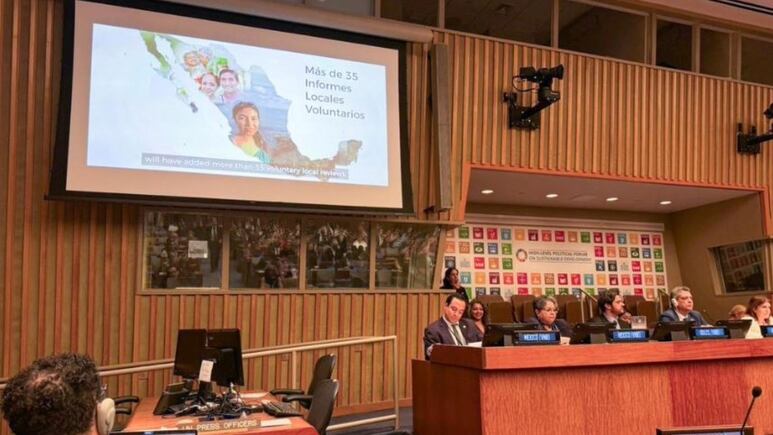Impact of Social Policies: Poverty and Inequality Decrease in Mexico
Five Million People Have Left Poverty. Ministry of Economy Presented Fourth National Voluntary Report

More than five million people have left the condition of poverty they were in, which has had a direct effect on reducing inequality, highlighted Raquel Buenrostro Sánchez, head of the Ministry of Economy of the Mexican government.
Publicidad
During the presentation of the Fourth National Voluntary Report at the 2024 High-Level Political Forum (HLPF) of the United Nations, the official detailed that in 2018, people in the richest decile earned 21 times more than those in the poorest decile, while in 2022 this difference was reduced to 15 times during the current administration.
“These achievements represent the greatest reduction recorded, not only in terms of poverty but also regarding inequality,” emphasized the official.
In Mexico, it is clear that among the Sustainable Development Goals (SDGs), one of the most pressing to fulfill is eradicating poverty. Thanks to social policies, such as doubling the minimum wage, universal pensions for people over 65, along with the historic moment for commerce, investments, and employment, good results can be reported for the most pressing SDG.
Publicidad
Additionally, farmers are reforesting over a million hectares in our country through the Sembrando Vida program, nearly three million apprentices are entering the workforce thanks to a partnership between the public and private sectors, and indigenous movements continue to resist the appropriation of their cultural heritage.
Publicidad
Each initiative from its field of influence merges with others; they are not isolated efforts but part of an integral vision. This report starts from the premise that the SDGs are not an abstract agenda, nor distant from the people.
At the Forefront of Accountability
On the contrary, it was intended to show that behind each progress towards a goal, there are millions of stories of women and men committed to positively impacting their environments.
“With the delivery of this Fourth National Voluntary Report, Mexico positions itself at the forefront of accountability before the international community and incorporates novel elements in favor of inclusion,” she stated.
Especially, she mentioned, that this report was not only translated into English but also into Nahuatl and Maya, two of the 68 indigenous languages that constitute Mexico’s rich cultural heritage. To achieve the proposed goals, it is essential to bring the SDGs to the territory under this approach. Over the past few years, close collaboration with state and municipal governments has been promoted, which have joined through the preparation of their local voluntary reports, reaffirming their commitment to this shared agenda.
As a result, Raquel Buenrostro announced that before the end of the year, Mexico will have presented more than 35 local reports, positioning the country as one of the nations worldwide that has rendered the most accounts through this mechanism.
In line with this, social actors such as companies, unions, and academia have dedicated themselves to reporting their contributions to the SDGs through sectoral reports, efforts that not only represent an innovative participation experience but also contribute to democratizing the 2030 Agenda.
Thus, the sum of all these efforts has allowed expanding the reflection in Mexico around the 2030 Agenda and the importance of promoting actions for a more sustainable future.
However, she asserted that for all this to come to fruition, it is necessary to build a vision of Shared Prosperity, in which everyone can see themselves reflected, which begins by leaving no one behind and no one out.
Publicidad
Últimas Noticias
Publicidad
Más Leídas | Heraldo USA
Alto funcionario del Kremlin advierte que Trump podría ser asesinado como JFK si gana la elección
Por Heraldo USA
Líderes de todo el mundo felicitan a Donald Trump tras convertirse en el nuevo presidente de EEUU
Por Heraldo USA
Sigue EN VIVO las noticias más recientes HOY 6 de noviembre día de las Elecciones en EEUU 2024
Por Heraldo USA
Kamala Harris vive vergonzoso momento al fingir realizar llamada a votantes
Por Heraldo USA
Publicidad
Más noticias de Poverty
Más noticias de Actualidad
Últimas Noticias
NASA informa que ENORME asteroide 2024 XN1 pasará muy cerca de la Tierra el 24 de diciembre 2024
Por Belén Álvarez
Kelly Clarkson desata todo tipo de comentarios tras reaparecer con 25 kilos menos | FOTOS
Por Belén Álvarez
Texas lanza polémica campaña para migrantes; “no vengan de forma ilegal o serán arrestados”
Por Belén Álvarez
No sólo México; Donald Trump también amenaza con imponer aranceles a Europa
Por Belén Álvarez
Cámara de Representantes aprueba plan para de financiamiento y frena cierre de gobierno
Por Belén Álvarez
Gastrolab MX
Jugo de chayote con piña, receta y beneficios
Por Gastrolab México
Como agua para chocolate: Receta original de Tita del pastel "Chabela" de la boda
Por Gastrolab México
Buen Fin 2024: Lista de restaurantes y negocios de comida con descuentos especiales
Por Gastrolab México
Jugo de nopal con apio para reducir el colesterol y proteger tu flora intestinal
Por Gastrolab México
Recetas fáciles y económicas para preparar: Cocina unos ejotes con pollo para la hora de la comida
Por Gastrolab México
Heraldo MX
Alertan a usuarios de Volaris, Aeroméxico y Vivaaerobus a partir del 1 de enero; esto pasará con tus boletos
Por El Heraldo de México
Ariadna Montiel informa que beneficiarios de la Pensión Bienestar recibirán una visita en sus casas
Por El Heraldo de México
Cómo luciría realmente la hermosa Caulifla de 'Dragon Ball Z' en la vida real
Por El Heraldo de México
¡Hay chamba! Banamex abre vacantes desde casa para CDMX, ofrece salario competitivo, aguinaldo, seguro médico y bonos
Por El Heraldo de México
Banamex alerta a usuarios con un ultimátum y tienen como límite el 31 de diciembre para no quedar fuera
Por El Heraldo de México













